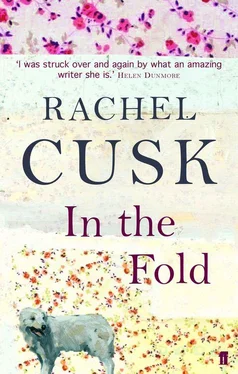Rachel Cusk - In the Fold
Здесь есть возможность читать онлайн «Rachel Cusk - In the Fold» весь текст электронной книги совершенно бесплатно (целиком полную версию без сокращений). В некоторых случаях можно слушать аудио, скачать через торрент в формате fb2 и присутствует краткое содержание. Год выпуска: 2006, Издательство: Faber & Faber, Жанр: Современная проза, на английском языке. Описание произведения, (предисловие) а так же отзывы посетителей доступны на портале библиотеки ЛибКат.
- Название:In the Fold
- Автор:
- Издательство:Faber & Faber
- Жанр:
- Год:2006
- ISBN:нет данных
- Рейтинг книги:3 / 5. Голосов: 1
-
Избранное:Добавить в избранное
- Отзывы:
-
Ваша оценка:
- 60
- 1
- 2
- 3
- 4
- 5
In the Fold: краткое содержание, описание и аннотация
Предлагаем к чтению аннотацию, описание, краткое содержание или предисловие (зависит от того, что написал сам автор книги «In the Fold»). Если вы не нашли необходимую информацию о книге — напишите в комментариях, мы постараемся отыскать её.
In the Fold — читать онлайн бесплатно полную книгу (весь текст) целиком
Ниже представлен текст книги, разбитый по страницам. Система сохранения места последней прочитанной страницы, позволяет с удобством читать онлайн бесплатно книгу «In the Fold», без необходимости каждый раз заново искать на чём Вы остановились. Поставьте закладку, и сможете в любой момент перейти на страницу, на которой закончили чтение.
Интервал:
Закладка:
‘He’ll come around,’ said Rebecca, sagaciously.
I guessed she was referring to the ‘big wheel’, a theory of events she had lately taken to propounding. Its basis was that existence is not linear but circular and repetitive. The idea was that you didn’t have to go out and get anything — you just sat and waited for it to come to you, and if it was meant to, it would.
‘He might just keep going the way he’s going,’ I said. ‘We all might.’
‘It’ll turn,’ said Rebecca.
She revolved something invisible on the axis of her hand to illustrate her point. I was surprised to see how slow and grinding the revolution was, as she conceived it. Her hand only moved an inch or two. She spoke quite blithely, though. It was not a chore to her, this turning. It was a spectacle from which evidently she derived a certain joy. I wondered whether the fact of our estrangement altered what I knew of the three years during which Adam and I were friends. It made me feel uneasy suddenly to think of it, as though everything that had happened since rested structurally and irremediably on that intensity that had given way so silently to indifference. Or, as though I had failed at numerous points in my life to establish whether it was for their lasting significance or their transitory attractiveness that I had chosen my circumstances, with the strange result that in the light of my friendship with Adam Hanbury, the existence I had constructed without him appeared to me momentarily as both insignificant and totally binding.
‘I heard he got married,’ I said. ‘I think they have some children.’
My wife shrugged and smiled a mysterious smile. It was unclear whether she was acknowledging she could provide no proof of this, or indicating that the subject of marriage and children was beneath her commentary. I wanted to take issue with the big wheel and the idea that we were all stuck on it going round and round, endlessly held at a remove from the things we wanted. I suspected Rebecca only liked it because it proved that nothing was your fault.
‘I don’t understand,’ I persisted, ‘why we don’t see each other. We used to see each other every day.’
‘I don’t know,’ said Rebecca, who was apparently becoming irritated. ‘It obviously wasn’t your time.’
She meant, in terms of predestination.
‘Was it all a waste, then?’
‘How should I know?’
‘You’re always telling me I should ask more questions.’
‘Some questions don’t have answers,’ said Rebecca. She looked fatigued. She fanned her face with her hand.
She had complained several times about the fact that I never asked her anything. What should I ask her? She didn’t know — that was one of the questions that didn’t have an answer. Sometimes I saw in her a yearning for a time of reckoning that I felt she didn’t fully understand. She seemed to think that a move into an era of analysis and interrogation would constitute a new, living chapter in our relationship, or a new source of nourishment, as though after a famine; where to me it was clear that it would signify only that our relationship was over, that the disaster had occurred and that neutral forces of rationality, of law and order and civilisation, were now washing over the wound. Marriage seemed to me to depend on two people staying together in time. It was like a race you ran together, a marathon. You kept your eyes ahead and you tried to surmount your weariness, and you reconciled yourself to the fact that while it may not be strictly enjoyable, at least running this race was healthy and strenuous and relieved you of the burden of thinking what else you might do with your time. I remembered a period of weeks or months when waking to the fact of my life with Rebecca was like waking to find an intricate, moving pattern of sunlight on my body.
She was wearing a garment that resembled a complicated piece of Victorian underwear. It was cross-hatched with ribbons and little buttons and straps and it was edged with gathered lace all around the neck, so that in its painstaking envelopment of her form it seemed almost to be expressing love for her. Her face was mournful. I had the feeling I had begun occasionally to have, as though I were reaching the bottom of a long fall into water and were experiencing the change in pressure as I hollowed out the end of my trajectory and began to rise again. All the things I had gone streaking past on the way down now hovered around and above me, immanent, patient.
‘Given that you always claim to feel so powerless,’ I said, ‘I don’t see why you cleave to theories that make a virtue out of passivity.’
‘What are you talking about?’ she said.
Her pale-blue eyes flashed past mine, little rents in her countenance. She looked momentarily lively. I had come to view Rebecca’s demeanour as involuntarily symptomatic of her consciousness, as though it were a drug she had taken whose crests and falls I had learned to read.
‘If I haven’t seen Adam Hanbury it’s because I haven’t bothered to pick up the telephone and talk to him. It isn’t because of any wheel, or because it wasn’t our “time”.’
In fact, as I spoke I realised that, as was often the case with Rebecca and me, the truth lay somewhere between us, lost.
‘Call him, then,’ shrugged Rebecca, with the clear suggestion that she regarded this as a typically dull, even a craven way to proceed, compared with waiting for Adam to ‘come around’.
That conversation was the first sign of the Hanburys, as a green spear poking through the brown earth might be the first sign of spring. Rebecca and I lived in Bath, in the middle of a Georgian terrace on Nimrod Street, in a house that belonged to Rebecca’s parents but which they were continually conferring on us, in one of the long, complicated strands of human intercourse of which their life was woven. The Alexanders liked to exist in a condition of sustained embroilment. Emotion by itself was a poor dish to serve up, without the accompaniment of a decent helping of practical, financial and social entanglement. It was this quality that attracted me to them, as it had attracted me to the Hanburys. Rebecca’s family never seemed to feel the need to bring anything to a conclusion. Whenever life retreated from them a step or two their response was always to pursue it and offer more, to attain new heights of risk and ridiculousness. They lived in a big house up the hill in Lansdown, which gave out views of the city that appeared to have been expropriated by conquest, and which was so beautiful and original inside that from the first minute I saw it, it could not help but become a factor in my feelings for the Alexanders. Every time I went there it aroused a strange need in me, as though for consummation; yet it made me anxious, too, with intimations of loss. The most striking feature of the house was at the back, where they had demolished a whole section of infrastructure to create one vast room. Entering this room was like rounding a bend to a view of the sea and feeling the burden of proportionality lift from your chest. It was the height and width of the whole house, and at the far end the outside wall had been replaced with enormous panes of glass, so that it shimmered and moved like water when the light came through. Up this wall of glass the Alexanders had trained three dark-green, tropical-looking cheese plants which stood in three big tubs on the floor. Over time they had climbed and extended themselves and met one another to form a great green web over the giant window. Some of their thick, rubbery leaves were two feet or more across and they curled out into the room from the dark, vigorous tangle of stems. The effect was slightly grotesque: the presence of this dark, creeping, living thing in the atrium of light was somehow monstrous. When I first saw it, it reached to about two-thirds the height of the room, but over time it found the ceiling and began to move inexorably outwards, horizontally over our heads. It both irritated and charmed me that the Alexanders had arranged something about which it was impossible to feel neutral at the very centre of their domestic habitat. Sometimes I found the presence of the plant almost intolerable, and sometimes it appeared to me as a stroke of genius, without which the room would lie naked and victimised in its bath of light. The sun came in as though through a pattern of lace. In summer, when the windows were open, the big, stiff, curled leaves slowly nodded and made the light wink and dance.
Читать дальшеИнтервал:
Закладка:
Похожие книги на «In the Fold»
Представляем Вашему вниманию похожие книги на «In the Fold» списком для выбора. Мы отобрали схожую по названию и смыслу литературу в надежде предоставить читателям больше вариантов отыскать новые, интересные, ещё непрочитанные произведения.
Обсуждение, отзывы о книге «In the Fold» и просто собственные мнения читателей. Оставьте ваши комментарии, напишите, что Вы думаете о произведении, его смысле или главных героях. Укажите что конкретно понравилось, а что нет, и почему Вы так считаете.












